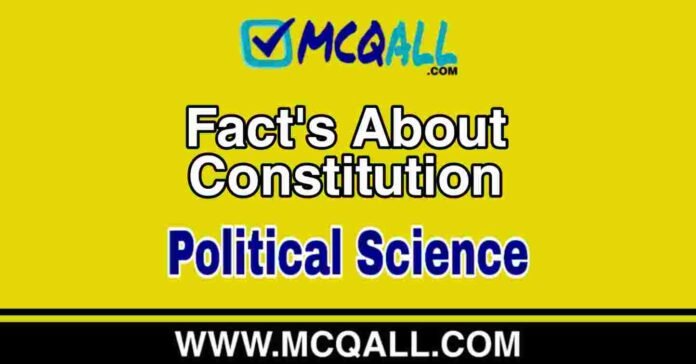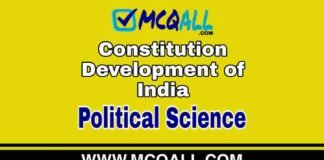Fact’s About Constitution – Political Science MCQ Question and Answer
Fact’s About Constitution – Political Science MCQ Question and Answer : Fact’s About Constitution – Political Science MCQ Question and Answer is given below. This Fact’s About Constitution – Political Science MCQ / Fact’s About Constitution – Political Science Quiz / Fact’s About Constitution – Political Science Question and Answer / Fact’s About Constitution – Political Science Multiple Choice Question, Short Question, Question and Answer, Suggestion, Notes are very important for school, college and various competitive or job exams and interviews.
Those of you who are looking for Fact’s About Constitution – Political Science MCQ Question and Answer, can read the questions and answers given below.
Fact’s About Constitution – Political Science MCQ
- The Finance Bill of Indian Government is presented in –
(A) Upper House
(B) Legislative Assembly
(C) Legislative Council
(D) Lower House
Answer : Lower House
Solution: The finance bill can only be presented to the Lok Sabha (lower house of parliament), the bill is then placed in the Rajya Sabha (upper chamber of parliament) and the Rajya Sabha can return the bill with or without its recommendation.
- An offence committed under the Scheduled Castes and
Scheduled Tribes (Prevention of Atrocities) Act, 1989 shall be investigated by a police officer, not below the rank of _________________________ .
(A) Sub-Inspector
(B) Inspector
(C) Deputy-Superintendent
(D) Superintendent
Answer : Deputy-Superintendent
Solution: According to Section 17(1) of Scheduled Castes and Scheduled Tribes (Prevention of Atrocities) Act, 1989, an offence committed under this Act shall be investigated by a Police Officer, not below the rank of Deputy Superintendent.
- The Public Accounts Committee submits its reports to –
(A) The Comptroller and Auditor General
(B) The Speaker of the Lok Sabha
(C) The Minister of Parliamentary Affairs
(D) The President of India
Answer : The Speaker of the Lok Sabha
Solution: The Public Accounts committee submits its report to the speaker of the Lok Sabha.
- Which of the following is not a tool of Parliamentary control over Public expenditures?
(A) Public Accounts Committee
(B) Comptroller and Auditor General of India (C.A.G)
(C) Estimates Committee
(D) Committee on Public Undertakings
Answer : Comptroller and Auditor General of India (C.A.G)
Solution: Article 148 of the Constitution of India provides for the Comptroller and Auditor General of India. He has powers in relation to and of any other authority prescribed under any law made by Parliament. So CAG is not a tool of Parliamentary control over Public expenditure whereas rest options are under parliamentary control.
- Consider the following statements about the ‘Right to Information (RTI) Act, 2005 and select one which has not been provided for or is specially exempted –
(A) It is not applicable in the State of Jammu and Kashmir.
(B) An applicant making request for information will have to give reasons for seeking information.
(C) Removal of Chief Information Commissioner.
(D) Every Information Commissioner shall hold office for a term of 5 years or until the age of 65 years, whichever is earlier.
Answer : An applicant making request for information will have to give reasons for seeking information.
Solution: All the provisions given in options are made under Right to Information Act, 2005 except the provision mentioned in option (b). Under Chapter II, Section 6(2) of Right to Information Act, 2005, an applicant making a request for information shall not be required to give any reason for requesting the information or any other personal details except those that may be necessary for contacting him.
- A resolutions passed by the Rajya Sabha under Article 249 of the constitution empowering parliament to legislate on a state subject in national interest remains in force for a period.
(A) Not exceeding six month
(B) Not exceeding two years
(C) Not exceeding one year
(D) Of unlimited time
Answer : Not exceeding one year
Solution: A resolution passed by the Rajya Sabha under Article 249 of the Constitution empowering Parliament to legislate on a state subject in national interest remains in force for a period not exceeding one year .[Article 249(2)].
- What should be the interval between the two consecutive session of Parliament ?
(A) Four Month
(B) Six Month
(C) 1 Year
(D) Fixed by the President
Answer : Six Month
Solution: Article 85(1) imposes a duty upon the President to summon each House of Parliament at such interval that six months shall not intervene between its last sitting in one session and the date appointed for its first sitting in the next session. So the Parliament must meet at least twice in a year.
- The Speaker can ask a member of the House to stop speaking and let another member speak. This phenomenon is known as :
(A) Decorum
(B) Crossing the floor
(C) Interpellation
(D) Yielding the floor
Answer : Yielding the floor
Solution: The speaker can stop a member of Parliament from
speaking and let another member speak. This phenomenon is known as yielding the floor.
- Who presides over the joint session of both the Houses of the parliament ?
(A) Speaker
(B) Vice – president
(C) President
(D) Prime Minster
Answer : Speaker
Solution: Article 108 of the Constitution of India is related to the Rule of Procedure. Joint session of two Houses is presided over by the Speaker of the Lok Sabha. During the absence of the Speaker from any joint sitting, it is presided over by the Deputy Speaker of the House or if he is also absent, the Deputy Chairman of the Council of States and if he is also absent such other person as may be determined by the members present at a sitting, shall preside.
- Who decides whether a Bill is mony Bill or Not ?
(A) President
(B) Speaker of Lok Sabha
(C) Finance Secretary
(D) Finance Minister
Answer : Speaker of Lok Sabha
Solution: Under Article 110 (3), it has been specified that if any question arises whether a Bill is Money Bill or not, the decision of the Lok Sabha Speaker on this issue shall be final.
Political Science MCQ Question and Answer
See also: – Political Science MCQ Question and Answer Click Here
Fact’s About Constitution – Political Science MCQ Question and Answer
Fact’s About Constitution – Political Science MCQ Question and Answer: Fact’s About Constitution – Political Science MCQ Question and Answer – Fact’s About Constitution – Political Science MCQ Question and Answer has been discussed above.
Fact’s About Constitution – Political Science Multiple Choice Question and Answer
Fact’s About Constitution – Political Science Multiple Choice Question and Answer: Fact’s About Constitution – Political Science Multiple Choice Question and Answer – Fact’s About Constitution – Political Science Multiple Choice Question and Answer discussed above.
Fact’s About Constitution – Political Science Quiz
Fact’s About Constitution – Political Science Quiz : Fact’s About Constitution – Political Science Quiz – Fact’s About Constitution – Political Science Quiz has been discussed above.
Fact’s About Constitution – Political Science Question and Answer in English
Fact’s About Constitution – Political Science Question and Answer in English: Fact’s About Constitution – Political Science Question and Answer in English – Fact’s About Constitution – Political Science Question and Answer in English.
Fact’s About Constitution – Political Science MCQ Question and Answer
If you benefit from this “Fact’s About Constitution – Political Science MCQ Question and Answer” post then our efforts will be successful. Also visit our MCQALL.COM website or follow us on various social networking sites (Telegram, Facebook, Youtube, Instagram, Twitter) to know MCQ – Multiple Choice Question Quiz on various topics, questions and answers quiz from GK and Daily Current Affairs. Thank you.












